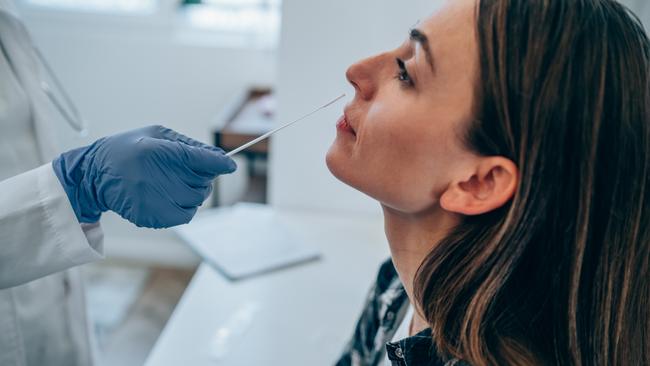New fast spreading Covid variant arrives in Australia
Just in time for Christmas a new fast-spreading Covid-19 variant has hit Australia, with cases rising tenfold in a few weeks.

Coronavirus
Don't miss out on the headlines from Coronavirus. Followed categories will be added to My News.
Exclusive: A rapidly spreading new “nightmare” Covid-19 variant has hit Australia’s shores – but experts say we should not panic.
The XBB strain, which is resistant to vaccines and antibodies from previous infections, emerged in Singapore a few weeks ago.
Within a week, it went from making up one fifth of the country’s Covid-19 cases to more than a half.
In Australia, there were 31,636 new cases of Covid-19 reported in the week to October 25 — an increase of 2.2 per cent.
In NSW, there were 10,050 cases of Covid-19 reported in the week ending October 27 — an increase of 13.7 per cent. There were 820 people in hospital and 16 deaths.
NSW detected 21 cases of XBB variant in the week ending October 15 and it made up 6.4 per cent of PCR tests subject to genomic analysis, a tenfold increase since the first cases were found on October 1.
In Victoria, cases surged by 24.7 per cent to 8537 in the week ending October 28 and hospitalisation rose 20.3 per cent to 172 patients. Seven lives were lost on average each day to Covid-19.

“Surveillance shows the presence of multiple Omicron subvariants in Victoria including rapid growth of (the Omicron subvariant) BQ. 1 and XBB in the past month, with a combined prevalence of approximately 10 per cent in wastewater and clinical sample,” Victoria’s chief health officer Professor Brett Sutton said in his latest update.
“Continued growth at these rates would see these subvariants overtake BA. 5 as the dominant variant.”
In Queensland, there were 4447 cases of Covid-19 reported in the week to October 25, with 105 people in hospital and 18 people dying.
These jurisdictions do not report Covid-19 variants.
Australian National University infectious diseases expert Professor Peter Collignon said so far, there was no evidence XBB was “more virulent, as judged by hospitalisations and deaths”.
And Deakin University infectious diseases expert Professor Catherine Bennett stressed Australians would have a stronger hybrid immunity to new variants, unlike the lead up to last Christmas when the Omicron and Delta strains ran wild.

“More than half the population has been both vaccinated and had an infection, and that does put you in a more resilient position in when facing future waves,” Professor Bennett said.
Professor Collignon estimated “80 per cent of Australians have had Covid”.
“We won’t see the same high hospitalisation and high death numbers that we saw between December and July, because that’s when all the variants were circulating and people were basically getting infected for the first time,” Professor Collignon said.
Around 64 per cent of current Covid-19 cases analysed in Australia are of the Omicron subvariant BA. 5 — down from 71 per cent of cases at the end of September.
Researchers in China found XBB can escape the antibodies generated by a BA. 5 infection.
This means it is also likely to outwit the latest bivalent vaccines which protect against Omicron, as well as the original Wuhan variant.
Infectious disease specialist Maria Van Kerkhove, who works on the Covid-19 response at the World Health Organisation, posted a video to Twitter last week raising concerns about the XBB variant.
“We do know that this recombinant has a significant growth advantage, all of the subvariants of Omicron are showing increased transmissibility and properties of immune escape,” Dr Van Kerkhove said.
Another new variant, detected in NSW, was the BQ. 1.1, which made up 3.3 per cent of cases that were subjected to genomic testing.
In the US, surveillance showed BQ. 1.1 was spreading, accounting for 11 per cent of recent cases.
All up, the World Health Organisation has detected more than 300 variants of Covid-19 that are circulating.
Dr Van Kerkhove expressed concerns, shared by Professors Collignon and Bennett, that systematic surveillance of Covid-19 was declining.
“Surveillance has declined, testing has declined, sequencing has declined and that in turn has limited our ability as an organisation with our expert networks around the world to assess these,” Dr Van Kerkhove said.

Professors Collignon and Bennett are calling for a co-ordinated national Covid-19 surveillance program involving regular sewage testing and tracking of patients with upper respiratory conditions presenting to hospitals and GPs.
Older and immunocompromised Australians are entering a period when their fourth Covid-19 vaccine is beginning to wear off 3-4 months after they received it and are being urged to mask up.
Health Minister Mark Butler said last week the Technical Advisory Group on Immunisation – ATAGI – was not likely to provide advice on whether the elderly and immunocompromised should have a fifth Covid-19 vaccine until next year.
More Coverage
Originally published as New fast spreading Covid variant arrives in Australia





